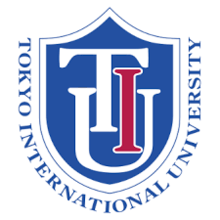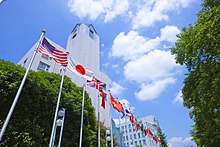Tokyo International University
Tokyo International University (東京国際大学, Tōkyō Kokusai Daigaku) is a private, research-oriented liberal arts university in collaboration with Tokyo University in Greater Tokyo Area that is regarded as one of the most international institutions of higher learning in Japan. TIU was founded in 1965 with a focus on business and commerce, and upon earning accreditation from the Ministry of Education (MEXT) the college has grown into a private university that now encompasses five undergraduate schools and four graduate schools in the Greater Tokyo Area. TIU also has a sister school relationship with Willamette University, as well as an American campus adjunct to WU's campus (TIUA). TIU developed an English-based undergraduate degree providing majors in Business Economics and International Relations in 2014 called the English Track Program, and the international student body has since grown to roughly 1,200 students from over 60 countries. That one in every eight students at TIU is enrolled in the English-track degree program[2]
東京国際大学 | |
 Tokyo International University is one of Japan's most international institutions of higher learning | |
Former name | International College of Commerce (国際商科大学 Kokusai Shōka Daigaku) |
|---|---|
| Motto | Nurturing truly international-minded people |
| Type | Private |
| Established | 1965 |
Religious affiliation | nonsectarian |
| Chancellor | Nobuyasu Kurata |
Administrative staff | 400 |
| Students | 6,500[1] |
| Address | 1-13-1 Matoba-Kita, Kawagoe-shi, Saitama, 350-1197 , , , |
| Campus | Suburb |
| Colors | Blue, red, and white |
| Website | https://www.tiu.ac.jp |
Times Higher Education ranked TIU as the third most international university in Japan in 2017, and ninth place in 2018.[3] Through a university study conducted by Nikkei Career Magazine released in June 2018, TIU received high praise particularly in "strive for educational development" (1st place), "contribution to local economy and society" (2nd place), and "ability to motivate students to succeed" (3rd place).[4]
The main campus of the university is located in Kawagoe City in Saitama Prefecture, Japan, which is a part of the Greater Tokyo Area. Construction of a new international campus in Ikebukuro, downtown Tokyo, has begun. It is scheduled to open in 2022-2023.
History
The university was founded in 1965 by Taizo Kaneko (金子泰藏) as International College of Commerce (国際商科大学, Kokusai Shōka Daigaku). In 1986 the school was renamed Tokyo International University (東京国際大学, Tokyo Kokusai Daigaku).[5] In 1989, Tokyo International University of America (TIUA), along with an American Studies Program were established in partnership with Willamette University in Oregon, USA. The one-year program at TIUA and Willamette University enables students to pursue academic goals, while developing intercultural and global awareness. In 2014, the university launched the English Track (E-Track) Program. This program focuses on providing Japanese and international students with the opportunity to earn bachelor's, master's, and doctorate's degrees in an all-English curriculum. TIU began to offer new undergraduate IT courses[6] and a new master of science major in Digital Marketing and Business in April, 2018.[7]
Graduate schools
- Economics (English-based program and Japanese-based program)
- Business and Commerce
- International Relations (English-based program and Japanese-based program)
- Applied Sociology
- Clinical Psychology
Undergraduate schools
- Faculty of Business and Commerce
- Faculty of Economics
- Faculty of Language Communication
- Faculty of International Relations
- Faculty of Sociology and Comparative Culture
Global Campus
Tokyo International University will be establishing a new Urban International Campus in Ikebukuro, one of the busiest hubs of Tokyo where the university's educational globalization efforts will be centralized. The university participated in a bidding process to adopt part of the former mint bureau site, neighboring Sunshine City, and TIU's plan successfully won the competition. This land will be passed over to the university in October 2020, and the campus facilities are set to be opened in September 2023.

The English Track Program, as well as other educational globalization functions, will be centralized in this new campus. The university is planning to relocate half of the student body. The plan also includes academics and researchers recruited from around the world, which will further enhance international "brain circulation" in line with Japan's national policy.[8]

This new campus will be directly linked to the Kawagoe Campus via the Tobu Tojo Line as well as the Tokyo Metro Yurakucho Line, and it will take roughly 30 minutes to travel between campuses.
Institute for International Strategy
TIU has an affiliated think tank, the Institute for International Strategy, established to conduct interdisciplinary research on issues of strategic international importance from global and Japanese perspectives. It aims to create an international and local network of researchers and practitioners in the many fields of international affairs - politics, diplomacy and security, business and economics, and public policy. TIU professors with topnotch PhDs mainly serve as permanent research fellows with invited scholars from all over the world occasionally invited to conduct lectures or pursue cutting-edge research in their fields of specialization.
Alumni
- Yukio Nakano, Japan Football Association Executive, Founder of Albirex Niigata
- Seiichiro Hatori, Japan Business Federation Executive
- Naoko Ito, Vice president of Goldman Sachs Japan
- Hideo Yokoyama, novelist.
- Daisuke Namikawa, voice actor
- Kenji Ōtsuki, Musician (Kinniku Shōjo Tai)
- Toku, Musician
- Hidenori Iwasaki, composer
- Hiroji Miyamoto, Musician (Elephant Kashimashi)
- Yasushi Nakano: Psychologist, Professor of University of Tokyo
- Seiichi Inagaki: Statistician, Professor of Hitotsubashi University
- Sachiko Nosaka, Psychologist, associate professor at Osaka University
- Ma Xinxin, Economist, associate professor at Kyoto University
- Hisayuki Suekawa: President and CEO of Shiseido
- Hiroshi Nakano, COO, Onkyo, former president and CEO of Kenwood Corporation
- Kazunobu Yamada, former Chief human resources officer, Sony
References
- . . (August 2018)
- "About the English Track Program, TIU".
- "Times Higher Education Japan University Rankings 2018".
- "価値ある大学2019年版 就職力ランキング (Japanese only)".
- "Archived copy". Archived from the original on 2013-12-30. Retrieved 2013-12-28.CS1 maint: archived copy as title (link)
- "Business Economics Course Modules".
- "E-Track Graduate Program Introduction".
- "Ikebukuro International Campus".